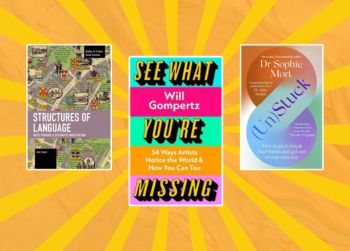Our frameworks or schemas, through which we interpret the world around us, can have profound implications for our wellbeing, including through our use of language. This includes the ways we may speak to ourselves internally which may keep us stuck in unwanted patterns. There have been many great thinkers throughout history who have illuminated new human possibilities, as well as artists who have the unique capacity can awaken us to a world of creative and imaginative wonder. These new personal development books will help you explore those topics in greater depth through a new pair of eyes:
Aging Angry: Making Peace With Rage / Barusch, Amanda Smith / Barusch, Amanda Smith
“An interdisciplinary look at the history and meaning of anger and a significant new interpretation of anger in later life. Never before in the history of humanity have so many people lived to be so very old. Throughout our past, a few individuals might have made it to old age but “mass aging” is a new concept for the human species. Now, more than ever, it is time for older adults to turn toward anger rather than denying or avoiding it. This book provides strategies and approaches for harnessing the power of anger at any age.” (Adapted from publisher/catalogue)
Beyond Genius: A Journey Through the Characteristics and Legacies of Transformative Minds / Atalay, Bülent
“This book delves into the nature of genius, examining the lives and works of Da Vinci, Shakespeare, Newton, Beethoven, and Einstein. It explores how these transformative geniuses, who redefined their fields and opened new realms of thought, drew inspiration and achieved remarkable feats. He investigates their traits, habits, and thought patterns to understand what sets these individuals apart and offers insights into humanity’s most prolific thinkers and creators.” (Adapted from catalogue)
Living the Artist’s Way: An Intuitive Path to Greater Creativity : A Six-Week Artist’s Way Program / Cameron, Julia
“In her bestselling book ‘The Artist’s Way’, Julia Cameron shared with her millions of readers the three main tools needed to unlock creativity. Here, she reveals the vital fourth which she relies upon daily to find creative inspiration: writing for guidance. Readers will learn radical new skills needed to take their creative work to the next level: connecting with their intuitive power and trusting the answers. For followers and newcomers alike, it will teach readers how to find greater happiness, productivity, and creative inspiration.” (Adapted from cover/catalogue)
See What You’re Missing: Thirty-One Ways Artists Notice the World – And How You Can Too / Gompertz, Will
“The rest of us spend most of our time on autopilot, rushing from place to place, our overfamiliarity blinding us to the marvellous, life-affirming phenomena of our world. But it doesn’t have to be this way. This engaging book takes us into the minds of artists – from emerging stars to old masters – to show us how to look at and experience the world with their heightened powers of perception. We learn how Guo Xi can help us see harmony, Peter Paul Rubens can help us see politically and how Alice Neel opens a window into other people’s souls. Each artist has their own unique way of looking, which, when applied to our own lives, stimulates our senses so we might know the intoxicating feeling of being truly alive.” (Adapted from dust jacket/catalogue)
Structures of Language: Notes Towards a Systematic Investigation / Casser, Joan
“An annotated commentary exploring Pêcheux’s theory of discourse and how language works in society. We need a real social science that goes beyond just accepting the commonly held beliefs about language and meaning. The theory builds on the work of Ferdinand de Saussure, who separated the sounds of language from their meanings. This was a big breakthrough in the field of linguistics. To help us understand how language works, other influential thinkers have also given their insights. For example, Noam Chomsky talked about how language is generated in our minds, John Searle explored the philosophy of language, B.F. Skinner discussed the role of internal factors in language, J.L. Austin studied how language is used in different situations, and Lacan introduced the idea of the symbolic order. All of these ideas together help us understand the way language shapes our understanding of the world.” (Adapted from publisher/catalogue)
(Un)Stuck: Five Steps to Break Bad Habits and Get out of Your Own Way / Mort, Sophie
“A guide for breaking bad habits and self-imposed barriers. It offers practical tips and exercises based on the science of habit formation to help readers create a more fulfilling life. The book addresses five key areas to overcome stagnation and self-sabotage, aiming to empower individuals to become the best version of themselves.” (Adapted from catalogue and cover)


